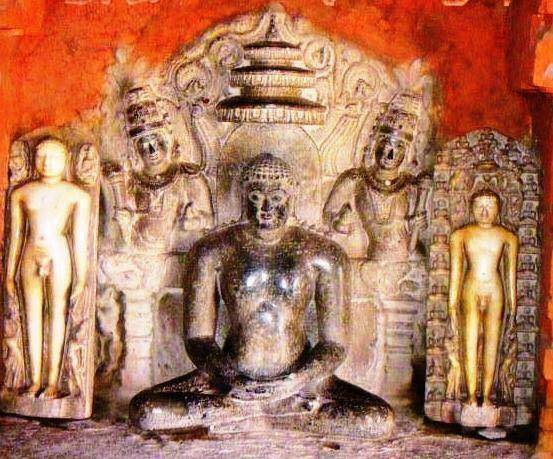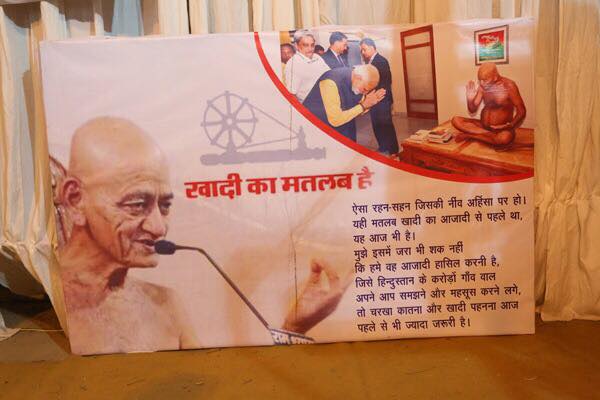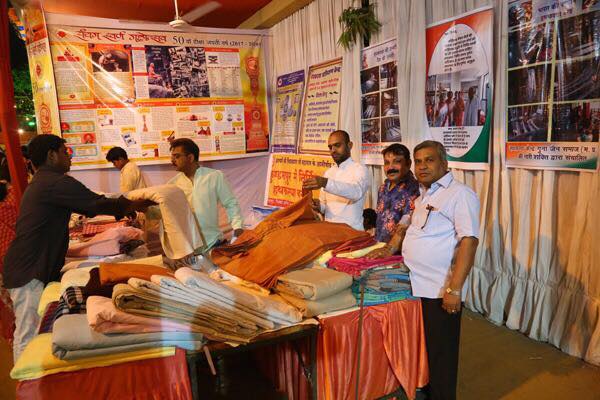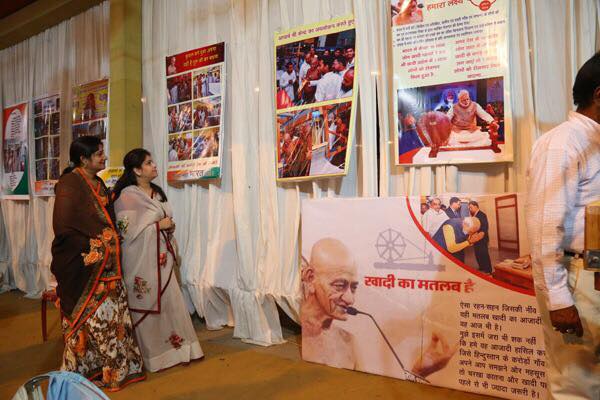News in Hindi
Baraha Bhävanäs/Anuprekshas (Twelve kinds of Reflections/contemplations) mainly for Monks but laymen can also contemplate about these
Jain religion puts a significant emphasis on the thought process of a human being. A person’s behaviour and his actions are the reflection of his internal thoughts. It is not only the action but also intention behind the action results in the accumulation of Karma. Hence, one should be very careful about his thoughts, and the subject matter of his thought.
To make room for pure thoughts, and to drive out the evil ones, Jainism recommends reflecting or meditating on the twelve thoughts known as the Twelve Bhävanä (Anuprekshä), or Reflections. These Twelve Bhävanäs are mainly for monks but laymen can also practice for these (refer post no. # 26 for four Bhävanäs of laymen).
These Twelve Bhävanäs cover a wide field in Jainism. They are designed to serve as an aid to spiritual progress leading to the path of renunciation. They are reflections upon the fundamental facts of life. They stop entry of new karmas as well as eradicate old karmas while one is engaged in these Bhävanäs (reflections). The followings are main twelve Bhävanäs or reflections/Contemplations:
1)Anitya Bhävanä (Impermanence):
All external substances including the body are transitory (Anitya). They are perishable and therefore, we should not have attachment for them.
2)Asharan Bhävanä (Helplessness):
Human beings are experiencing tremendous agitation. When death occurs and the soul has to leave the body there is no one who can save a Jiva who is helpless. Wealth, family etc. have to be given up at such a time. No worldly things can provide refuge so why should we depend upon them.
3)Sansär Bhävanä (Cycle of life and death):
In the cycle of Sansär, i.e. birth and death, mother can become wife; wife can become mother; and an enemy can become a friend; etc. How futile is the world? We should not have any attachment for it.
4)Ekatva Bhävanä (Solitariness):
“I am alone, I was born alone, I will die alone, I am sick alone, I have to suffer alone, I have to experience the karmas, which I have acquired alone.” Therefore, one should be cautious and keep away from attachment and hatred.
5)Anyatva Bhävanä (Otherness of the body):
“This body is transitory and it is different from me. I am the soul, which is not perishable. The body is perishable and wealth and family are not mine. They are different from me; therefore, I discard attachment for all these things.”
6)Ashuchi Bhävanä (Impurity of body):
“This body is made up of impure substances. Impure substances are nourishing it. I will discard my attachments for this body and engage myself in self-discipline, renunciation, and spiritual endeavours.”
7)Äsrava Bhävanä (Inflow of karma):
Thinking on inflow of karmas. All causes that create the inflow of karmas should be discarded.
8)Samvar Bhävanä (Stoppage of karma):
Samvar means blocking the inflow of karmas. One must contemplate on Samiti, Gupti, Yati-dharma etc (we will talk about this in future posts). One must carry out these activities and try to reduce or stop new bondage of karma.
9)Nirjarä Bhävanä (Eradication of karma):
Nirjarä means to shed off whatever karmas we have. One must think of the benefits that accrue from each of the 12 kinds of Tapas or the austerities, which cause Nirjarä. One must contemplate on these austerities in order to destroy sins.
10)Lokasvabhäva Bhävanä (The nature of cosmos):
Lokasvabhäva means one must contemplate on the three Lokas (World), namely: 1) the upper world, 2) the middle world, 3) the lower world, and also the whole universe filled with souls and Pudgalas (matters).
11)Bodhidurlabha Bhävanä (Rarity of enlightenment):
One must contemplate on how difficult it is for the souls that are wandering aimlessly in the four stages of existence in the Sansär to attain the Jina dharma (liberation). There should not be even the slightest negligence in observing the religion propagated by the Jina.”
12)Dharma Bhävanä (Religion):
“Oh: Arihanta Bhagawän, the omniscient, has expounded an excellent Shruta Dharma and Chäritra Dharma. I will engage myself in these Dharmas.”
One should carry out these contemplations again and again to detach oneself from all mundane things of this world.
However, there are four auxiliary Bhävanäs (refer post no.#26) that represent the positive means of supporting the Five Vows. They are intended to develop purity of thought and sincerity in the practice of religion. They play very important role in the day-to-day life of a householder and these reflections can be practiced very easily. Adopting these Bhävanäs in daily life can make a person very virtuous.
--- www.jinvaani.org @ Jainism' e-Storehouse ---
#Jainism #Jain #Digambara #Nirgrantha #Tirthankara #Adinatha #LordMahavira #MahavirBhagwan #RishabhaDev #Ahinsa #Nonviolence
 Source: © Facebook
Source: © Facebook
भक्ति निःस्वार्थ होना चाहिए -आचार्य श्री विद्यासागर महाराज जी @ डोंगरगढ़ exclusive 😊
छत्तीसगढ़ के प्रथम दिगम्बर जैन तीर्थ चंद्रगिरि डोंगरगढ़ में विराजमान दिगम्बर जैन आचार्य श्री विद्यासागर महाराज जी के षिष्य मुनि श्री निर्दोष सागर जी ने रविवार को हुये प्रवचन में कहा की आचार्य श्री कहते है कि भक्त कि भक्ति निःस्वार्थ होना चाहिए जिसमे किसी भी प्रकार की फल की प्राप्ति की कामना नही होना चाहिए तभी वह भक्ति सच्ची भक्ति होती है। उन्होने उदाहरण के माध्यम से समझाया कि भक्त दो प्रकार के होते है एक भक्त मंदिर में भगवान ने जो छोड़ा है उसकी प्राप्ति के लिये जाते है और दूसरे वे जो भगवान ने प्राप्त किया है उसे प्राप्त करने के लिये जाते है। हमे मंदिर भगवान से कुछ मांगने नही जाना चाहिए बल्कि उनके जैसा बनने के लिये जाना चाहिए। मुनि श्री ने कहा कि बिना गुरू के लक्ष्य की प्राप्ति संभव नही है। मुनि श्री ने प्रतिभा स्थली की बच्चीयों और चंद्रगिरि प्रांगण में उपस्थित सभी लोगो को स्वस्थ्य और सुखी रहने के 3 मूल मंत्र दिये कि -
खाना कम चबाना ज्याादा। बोलो कम विचारो ज्यादा। बड़ो से विनय और छोटा से स्नेह करो!
मुनि श्री योग सागर जी ने कहा कि - दान परिग्रह का प्रायष्चित है इसमे अहंकार नही होना चाहिए। यदि आप दायें हाथ से दान कर रहे हो तो आपके बाएँ हाँथ को भी इसका पता नही चलना चाहिए। एक दृष्टांत के माध्यम से दान की महिमा बताई कि दान सिर्फ अमीर व्यक्ति ही नही कर सकते बल्कि गरीब से गरीब व्यक्ति भी दान कर सकते है। उन्होने बताया कि एक गरीब किसान किसी महाराज जी के दर्षन करने को पहुंचा तो वह महाराज जी से कहने लगा कि मै बहुत गरीब हूँ मै तो कुछ भी दान नही कर सकता तो महाराज जी ने किसान से पूछा कि आप कितनी रोटी खाते है तो किसान ने कहा कि वह 6 रोटी खाता है तो महाराज ने कहा कि आप 5 रोटी खाएँ और 1 रोटी को दान कर दे। यह सुनकर किसान बहुत प्रसन्न हुआ और उसकी दान करने के भाव इतने निर्मल थे कि वह बहुत खुषी - खुषी यह कार्य रोज करने लगा तो एक दिन स्वर्ग से एक देव उसकी परीक्षा के लिये पृथ्वी पर सिंह का रूप धारण कर मंदिर में घुस गये तो गाँव के सभी लोग डर के कारण मंदिर में प्रवेष नही कर रहे थे और काफी भीड़ मंदिर के बाहर जमा हो गयी तब किसान रोज कि तरह मंदिर में 1 रोटी चढ़ाने आया तो उसको लोगो ने रोका की अंदर मत जाओ वहाँ सिंह बैठा है तो उस किसान ने कहा मुझे जाने दो और वह किसी कि नही सुना और मंदिर के अंदर गया और रोज कि तरह 1 रोटि मंदिर में दान किया और अपने काम के लिये चला गया कुछ समय बाद देव किसान के पीछे - पीछे गये और अपने असली स्वरूप में आये और किसान के पैर पड़े और कहा आपका त्याग धन्य है और आपकी भक्ति भी सच्ची है। फिर एक दिन गाँव में राजकुमारी का स्वयंबर था तो वह किसान भी राजा के दरबार में स्वयंबर देखने गया था वह दूर एक पेड़ के नीचे बैठा था और वहाँ राजमहल में कई राजकुमार सजे - धजे हुये आसन पर विराजमान थे तभी राजकुमारी वर माला लेकर आयी और बारी - बारी सभी विराजमान राजकुमारों को देखने लगी फिर पास में खड़े पूरे गाँव वालो को एक - एक कर देखा फिर वह राजकुमारी माला लिये किसान के पास गयी और उसके गले में वर माला डाल दी। राजकुमारी से जब पूछा गया कि अगर गाँव के गरीब किसान से ही शादी करनी थी तो इन राजकुमारों की बेजती करने क्यों राज महल के दरबार में उन्हे बुलाया तो राजकुमारी ने शालिनता से कहा कि मैने किसान के मस्तिष्क पर चंदन का तिलक देखकर उसके गले में वर माला डाली जबकि उस समय उस दरबार में किसी भी राजकुमार एवं प्रजा के माथे पर चंदन का तिलक नही था। मुनि श्री ने इस दृष्टांत के माध्यम से हमे यह समझाया कि दान छोटा या बड़ा नही होता उसके पीछे हमारी क्या भावना है, हमारा विचार कैसा है, हमे संतोष है कि नही यह मायने रखता है। उन्होने कहा कि सुख साधन में नही साधना में है। मुनि श्री ने कहा आप विद्यासागर क्यों नही बन पा रहे? उन्होने कहा कि विद्यासागर बनने के लिये गुरू चरण के साथ - साथ उनका आचरण भी हमें अपनाना चाहिये। गुरू चरण तो छू लिया तूमने तो कई बार एक बार आचरण को छू लो तो हो जाये भव सागर पार।
💐-चंद्रगिरि डोंगरगढ़ से निषांत जैन
••••••••• www.jinvaani.org •••••••••
••••••• Jainism' e-Storehouse •••••••
#Jainism #Jain #Digambara #Nirgrantha #Tirthankara #Adinatha #LordMahavira #MahavirBhagwan #RishabhaDev #Ahinsa #AcharyaVidyasagar
कानपुर संयम स्वर्ण महोत्सव
 Source: © Facebook
Source: © Facebook
 Source: © Facebook
Source: © Facebook
 Source: © Facebook
Source: © Facebook
